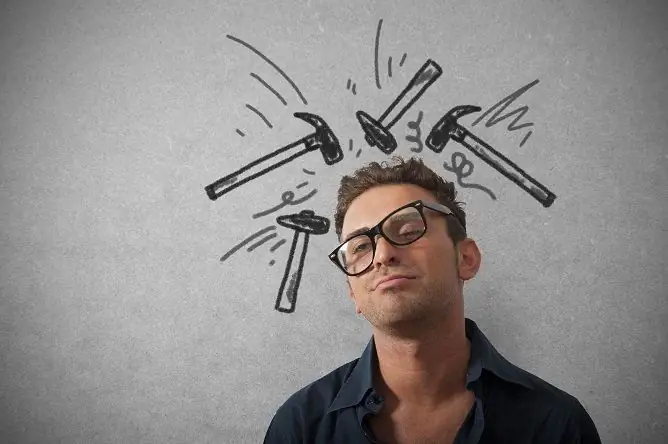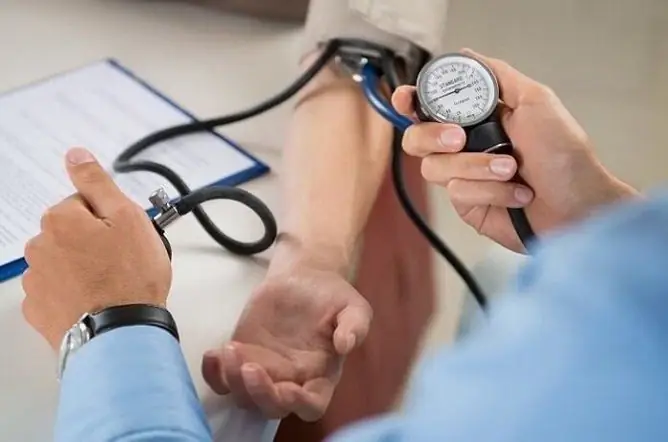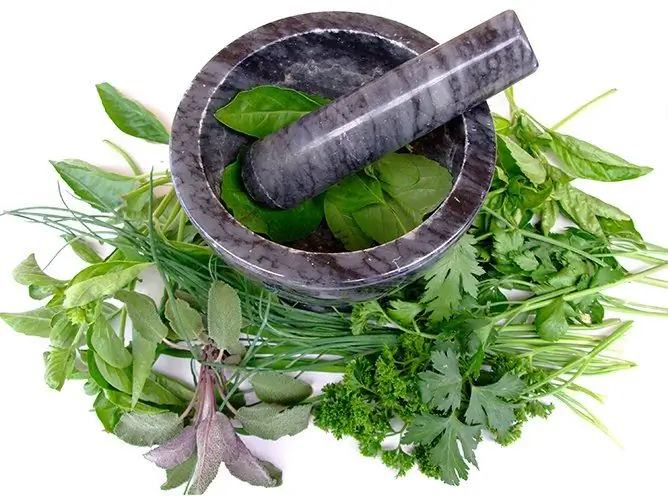First aid for high pressure: ambulance at home, causes and signs of hypertension
The content of the article:
- First aid for high blood pressure at home
- High-pressure emergency drugs
- Causes and risk factors for the development of arterial hypertension
- High blood pressure symptoms
- Prevention
- Video
It is necessary to know how to provide first aid at high blood pressure both to the patients with arterial hypertension and to their loved ones, this often helps to avoid the development of severe consequences of arterial hypertension, including myocardial infarction, stroke, acute heart failure, etc.
An ambulance is required with a sharp increase in blood pressure (BP), as well as with a significant increase. If the attack does not occur for the first time, you can reduce the pressure on your own, following the recommendations of your doctor. The reason for immediate medical attention should be a sharp deterioration in the patient's condition, intense headache that cannot be stopped by analgesics, heart pain, too high or low pulse.

Hospitalization is required for the first hypertensive crisis, in the presence of severe pain in the heart region that cannot be stopped by nitroglycerin, or in case of suspicion of the development of acute cerebrovascular accident (loss of consciousness, articulation disorders, decreased sensitivity).
It is important to take into account that blood pressure should be reduced gradually, no more than 30 mm Hg. Art. in 1 hour. Doing this too quickly increases the risk of myocardial ischemia.
What drugs and in what dosage should be used to lower blood pressure should be determined by the attending physician. The choice of certain drugs depends on the cause of the development of the pathological process, clinical signs, the presence of complications, contraindications and a number of other factors. Self-medication for arterial hypertension is highly undesirable; it can only aggravate the patient's condition.
To normalize pressure, herbal folk remedies can be used, but it should be remembered that they usually do not have a quick effect, and therefore cannot be used if necessary to reduce pressure urgently.
First aid for high blood pressure at home
Before the arrival of the ambulance team with high pressure, the patient should be given emergency assistance, this greatly improves the prognosis of the disease.
First of all, you need to help the patient to take a comfortable lying or semi-sitting position by placing several pillows under the back. With this position of the body, the load on the heart muscle decreases and blood circulation improves. The patient is advised to regain breathing by taking several slow deep breaths and exhalations, and try to calm down. It is necessary to provide access to fresh air, for which open the window or window, loosen the clothing that squeezes the body.
Before the arrival of an ambulance, it is advisable to measure blood pressure several times, the results obtained must be reported to medical workers. Blood pressure should be measured approximately every 15 minutes. Upon arrival, the doctor needs to provide information about this, as well as about all the drugs that the patient has taken.
If a person with high blood pressure is at home alone, after calling an ambulance, it is advisable to open the door, take a sitting position, placing within the reach of medicines that may be needed before the arrival of medical workers, as well as a tonometer.
High-pressure emergency drugs
If the patient has already been prescribed any medications for such cases by the doctor, they should be used. Some drugs for high blood pressure can be taken orally or sucked under the tongue, in the latter case, the speed of the drug is faster.
Long-acting antihypertensive drugs (eg, Captopril) are often prescribed for these situations. The tablet is placed under the tongue, where it should be kept until completely dissolved.
15-20 minutes after using Captopril or its analogue, you can take a diuretic (for example, Furosemide, Lasix). Typically, the pressure is reduced within 20 minutes.
Half an hour after taking the Captopril tablet, you can make a control pressure measurement. If the indicator has decreased by 20-30 units from the original, you do not need to reapply the medicine. If there is no effect after the first Captopril tablet, you can drink another one after 30 minutes. Do not take more than two tablets.
Ambulance drugs include Validol, which is used for rapid heart rate, arrhythmias, chest pain. In similar cases, it is recommended to take Nitroglycerin.
For cardiac arrhythmias and angina pectoris, Anaprilin (Propranolol) is effective.
To reduce anxiety, you can use Valocordin or Corvalol, valerian tincture, motherwort.
Hot foot baths, foot compresses with table vinegar, and mustard plasters on the calf muscles will quickly help reduce blood pressure.
An ambulance at high pressure consists in the injection of antihypertensive drugs (Dibazol, Papaverine), but this should not be done on your own, this is the competence of a medical worker.
Causes and risk factors for the development of arterial hypertension
Blood pressure is the pressure that blood exerts on the vascular wall of the arteries. The value of this indicator depends on the strength of the heartbeat, the amount of blood in the body, the tone of the blood vessels.
Normal blood pressure is 120 to 80 mm Hg. Art., this value may slightly deviate in one direction or another.
Increased blood pressure (arterial hypertension, hypertension) is considered to be a parameter exceeding 140 to 90 mm Hg. Art. The danger of arterial hypertension, first of all, lies in the fact that it may not have symptoms for a long time and not attract the attention of the patient, often up to the development of a hypertensive crisis.
Arterial hypertension develops when the patient has diseases of the cardiovascular, central nervous systems, kidneys, endocrine disorders, changes in hormonal levels, the presence of bad habits, a sedentary lifestyle. A short-term increase in blood pressure can occur when the weather changes, excessive physical exertion, the use of certain foods and drinks, mental overload, and the intake of a number of medications.

Captopril is often used as an ambulance for hypertension.
Stress, physical activity, changes in meteorological conditions, as well as some diseases can provoke the development of a hypertensive crisis. The most common cause of a hypertensive crisis is a strong psycho-emotional overstrain.
High blood pressure symptoms
The main symptom of high blood pressure is a persistent headache of a pressing and bursting nature, which cannot be stopped by conventional analgesics. In addition, a person may complain of chills, shortness of breath, cold extremities. He has facial hyperemia, pulsation of the carotid artery, and panic. In some cases, hypertension makes itself felt by the development of apathy, irritability, daytime sleepiness, edema of the face and / or extremities in the patient. Often, with high blood pressure, there is a deterioration in hearing and vision, dizziness.
In a hypertensive crisis, due to a sharp and significant increase in blood pressure, the load on the walls of blood vessels and on the heart increases, which disrupts the blood supply to organs and tissues. The condition is manifested by a sudden and significant deterioration in well-being: intense headache, nausea up to vomiting, flickering of black dots before the eyes, noise or squeak in the ears, numbness of the fingers and / or facial muscles, visual impairment, increased sweating, and sometimes impaired consciousness.
Prevention
To prevent the development of arterial hypertension, it is recommended to normalize the mode of work and rest, to abandon physical and psycho-emotional overload, as well as bad habits. Adequate night sleep (at least 8 hours a day), proper nutrition, an active lifestyle, timely treatment of diseases that can lead to an increase in blood pressure are required. Patients with hypertension should follow all the recommendations of the attending physician, regularly monitor blood pressure and take supportive medications.
Video
We offer for viewing a video on the topic of the article.

Anna Aksenova Medical journalist About the author
Education: 2004-2007 "First Kiev Medical College" specialty "Laboratory Diagnostics".
Found a mistake in the text? Select it and press Ctrl + Enter.







